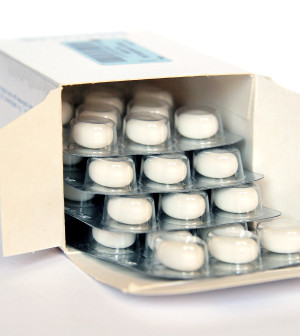- 10 Strategies to Overcome Insomnia
- Could Artificial Sweeteners Be Aging the Brain Faster?
- Techniques for Soothing Your Nervous System
- Does the Water in Your House Smell Funny? Here’s Why
- Can a Daily Dose of Apple Cider Vinegar Actually Aid Weight Loss?
- 6 Health Beverages That Can Actually Spike Your Blood Sugar
- Treatment Options for Social Anxiety Disorder
- Understanding the Connection Between Anxiety and Depression
- How Daily Prunes Can Influence Cholesterol and Inflammation
- When to Take B12 for Better Absorption and Energy
Health Food Stores Urge Supplements to Underage Teens: Study

Many health food store employees recommend muscle-building supplements to teens, even though doctors warn the products should not be used by anyone younger than 18, a new study says.
A student researcher from Cohen Children’s Medical Center in New Hyde Park, N.Y., called 244 national chain and independent health food stores, posing as a 15-year-old football player. He told them he wanted to use sports performance supplements with creatine, to boost his muscle mass and strength.
Creatine has not been proven safe for teens, and the American Academy of Pediatrics (AAP) and American College of Sports Medicine recommend no one younger than 18 use it.
Even so, the study found that 67 percent of health store sales clerks recommended creatine. Nearly 29 percent recommended it when asked about it and about 38 percent recommended it without prompting. Male clerks were more likely than female clerks to recommend creatine without prompting.
“Body image issues are becoming more prevalent for all ages and genders. Employees in stores that sell supplements must be educated regarding which specific products are safe for use by minors,” said senior investigator Dr. Ruth Milaniak, a behavioral pediatrician at Cohen Children’s.
Customers of all ages need to be warned about the dangers of weight loss and body-shaping supplements, she said.
“If teenagers are being recommended supplements that not only have adverse effects for their growing bodies but are clearly marked on the package as not for use under the age of 18, they are being put at risk by the very stores that they are going to for advice on health,” Milaniak said in an AAP news release.
The researchers recommended that parents and doctors speak to teens about supplement use. They said the extent of this problem is not fully known, since supplements are not regulated by the U.S. Food and Drug Administration and do not need a prescription.
The study will be presented Saturday at the APP’s national meeting, in Washington, D.C. Studies presented at medical meetings are typically considered preliminary, because they are not subject to the rigorous peer review of published research.
More information
The U.S. Food and Drug Administration has more about dietary supplements.
Source: HealthDay
Copyright © 2026 HealthDay. All rights reserved.










